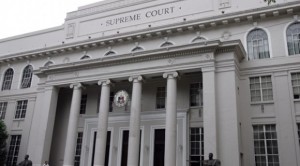Through what Christians would call the workings of Divine Providence, the national thanksgiving Mass following the canonization of Saint Pedro Calungsod will fall at a critical time in Philippine history.
Cited earlier this year as the country with the highest number of theists, the Philippines has been declared open for business by President Benigno Aquino III in his third State of the Nation Address. It is of late the second best performing Southeast Asian economy and is awaiting the culmination of a peace process with the Moros while being locked within an election year in a territorial dispute with its dragon neighbor China.
With up to at least a million people expected to join the Nov. 30 ceremonies at Cebu City’s South Road Properties and millions more anticipated to witness the event live through various media, the hierarchy of the Catholic Church will have an unprecedented moment to address the faithful.
Already, the Vatican, by confirming that Angelo Cardinal Amato, prefect of the Congregation for the Causes of Saints will attend the rites, has given Filipino Catholics another nod of confirmation in their de facto position as the Asian if not the global stronghold of the faith.
Notably, Amato, who leads the Church’s saint-vetting bureau did not find it necessary to personally attend earlier this month Canada’s national thanksgiving Mass in honor of Saint Kateri Tekakwitha, who was Saint Pedro Calungsod’s canonization batch mate.
Everyone concerned will need to closely watch what the hierarchy led by Amato and including Cebu Archbishop Emeritus Ricardo Cardinal Vidal, Manila Archbishop Emeritus Gaudencio Cardinal Rosales, Cebu Archbishop Jose Palma and Manila Archbishop Luis Antonio Cardinal Tagle will do in the Nov. 30 Mass.
Coming off a global meeting on the subject of what Pope Benedict XVI calls the New Evangelization or the rekindling of the fire of faith in predominantly Catholic countries, the bishops at the thanksgiving Mass will be expected to motivate the faithful to shine brighter, after Saint Pedro Calungsod’s example, as witnesses to Jesus Christ.
But the spiritual message will have down-to-earth repercussions, most probably in the form of reignited Catholic activism in every area of Philippine social, economic and cultural life.
Saint Pedro Calungsod has been warmly welcomed by Catholic Filipinos. Their foremost question now pertains to the relevance his canonization has on how they will conduct their daily affairs from the family to the government and even all the way to the polling precincts.
The spiritual and by definition non-partisan tone of the bishops’ message will be parsed by Catholic leaders and can influence public discourse on issues as seemingly disparate as the Reproductive Health Bill and Christian missionary efforts in the Far East.
With the presence of the Internet, the dissemination of the message will be quick. The common ground among those who wait for the message is that they await a message of hope amid the strains and tensions of the Philippine status quo.


